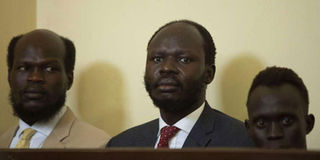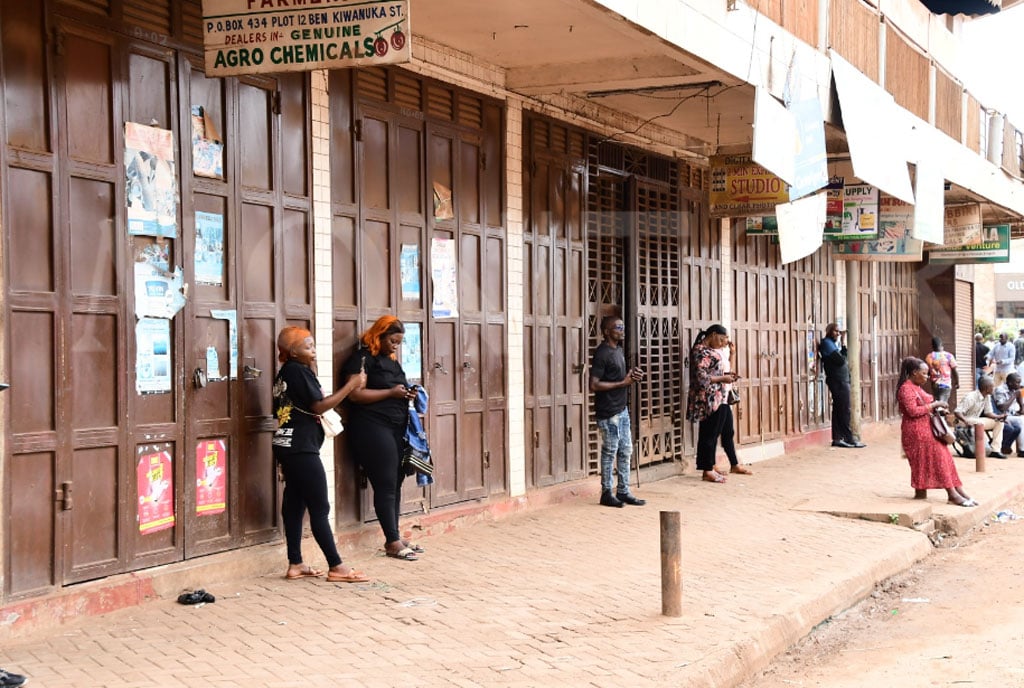South Sudan activist arrested in US for attempting to smuggle weapons to Juba

South Sudan activist Peter Biar Ajak (centre) looks on during his first appearance before the judiciary headquarters in Juba, South Sudan on March 21, 2019.
What you need to know:
- The US Department of Justice said on Tuesday that Mr Ajak, 40, and his compatriot Abraham Chol Keech, 44, were charged with conspiring to purchase and "illegally export millions of dollars' worth of military weapons" to South Sudan.
South Sudanese activist Peter Biar Ajak has been arrested and charged in the US with attempting to smuggle $4 million worth of weapons into his country, potentially tarnishing his profile as an anti-graft campaigner.
The US Department of Justice said on Tuesday that Mr Ajak, 40, and his compatriot Abraham Chol Keech, 44, were charged with conspiring to purchase and "illegally export millions of dollars' worth of military weapons" to South Sudan. They intended to export the weapons under a false contract, according to the charges.
The weapons included automatic rifles, grenade launchers, Stinger missile systems, hand grenades, sniper rifles, ammunition and other export-controlled items from the United States to South Sudan.
Export arms
The export of arms of any kind to South Sudan is prohibited by the UN Security Council arms embargo and by two US laws - the Arms Export Control Act (AECA) and the Export Control Reform Act (ECRA). The UN Security Council imposed the embargo to slow a civil war that broke out in 2016.
The war ended in 2018, following a peace deal between President Salva Kiir and various armed groups. But the embargo, which was imposed in 2018, was recently extended until May this year. Ajak would also have had to obtain a licence from the State Department to export arms to South Sudan. He didn't.
"As alleged, the defendants attempted to illegally smuggle heavy weapons and ammunition from the United States into South Sudan - a country subject to a UN arms embargo due to violence between armed groups that has killed and displaced thousands," said Assistant Attorney General Matthew G. Olsen of the Justice Department's National Security Division, according to a release from the department on Tuesday.
"The Department of Justice will not tolerate the illegal export of weapons overseas, and we will hold accountable those who would violate our laws."
Asylum seeker
For Dr Ajak, the case could ruin his reputation, firstly as an activist who criticised his home government for bad governance, and secondly as a genuine asylum seeker who sought refuge in the US to avoid persecution in his home country.
In July 2020, Ajak had secured a visa to the US after arguing his case as a persecuted person. He had claimed that unidentified security agents from Juba had followed him to Nairobi, where he lived, and had attempted to abduct him.
The South Sudanese government subsequently denied the allegation, although Ajak had in fact been detained in Juba for several months before being released. Some of his fellow activists have disappeared, and rights groups such as Human Rights Watch have accused South Sudan's spy agency of abducting and killing them. Juba denied the allegations.
In Nairobi, he often appeared on TV programmes on regional issues and criticised the South Sudanese government.
The two face up to 20 years in prison if convicted of illegal arms trafficking and a further ten years for attempted smuggling. The charges relate to their efforts between February 2023 and last month to illegally purchase weapons and related export-controlled items from undercover law enforcement officers, and "to smuggle those weapons and items from the United States through a third country to South Sudan".
"The defendants knew that South Sudan was subject to an arms embargo and that exporting arms and ammunition from the United States to South Sudan without a license from the U.S. government was illegal and would violate U.S. law.
The two were reportedly keen to cut through the red tape after ordering some $4 million worth of weapons and related items. They wanted to buy them under a 'fake contract' for 'consultancy services' and items mislabelled as 'communication equipment' relating to 'human rights, humanitarian and civic engagement in South Sudan refugee camps'. They then transferred the money through an intermediary company named in the fake contract to complete the purchase.





